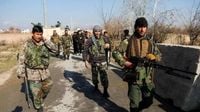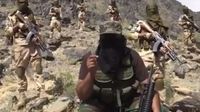In a significant escalation of violence in Balochistan, the Baloch Liberation Army (BLA) has claimed responsibility for a deadly attack that resulted in the death of an officer from Pakistan's Inter-Services Intelligence (ISI) and another agent. The incident occurred in the Pasni region on April 28, 2025, marking a notable strike against the Pakistani military's intelligence operations in the area.
According to reports from the BLA, the targeted operation was executed based on specific intelligence regarding the movements of ISI officer Muhammad Nawaz, who was traveling in disguise as part of a so-called 'death squad'. The attack involved the use of a remote-controlled improvised explosive device (IED) that detonated as Nawaz's convoy passed through Pasni, resulting in his death and that of his associate, Salman, while another agent, Shah Nazar, sustained injuries.
Jeeyand Baloch, a spokesman for the BLA, detailed the operation, stating that Nawaz, a resident of Khushab district in Punjab, was under constant surveillance by the BLA's intelligence wing, known as Ziraab. This intelligence unit had been monitoring his activities closely, and the operation was executed with precision, leading to the complete destruction of their vehicle.
In addition to targeting the ISI agents, the BLA also conducted multiple operations against the Pakistani military and police forces. These included a sniper attack on Pakistani soldiers in the Jamaki Tank area of Zamuran, which resulted in the death of one soldier. Furthermore, BLA fighters set up a blockade on the Quetta-Karachi main highway at Khazinai in the Mangocher area of Kalat, conducting snap checks on vehicles during the night of April 27 and 28.
During these operations, the BLA specifically targeted vehicles associated with the Saindak Project, a controversial mining initiative in the region. The group has been vocal in its opposition to projects seen as encroaching on Baloch land and resources, often citing them as examples of exploitation by the Pakistani state.
On April 29, 2025, various news outlets reported that the BLA's series of attacks come in the wake of a deadly terrorist strike in Pahalgam, Jammu and Kashmir, which left 26 civilians dead just a week earlier. The National Investigation Agency (NIA) indicated that the Pahalgam attack involved 5 to 7 terrorists, with assistance from local individuals trained in Pakistan. The NIA has since released sketches of three suspects identified as Pakistani nationals: Asif Fauji, Suleman Shah, and Abu Talha.
The BLA has emerged as one of the most prominent separatist groups in Pakistan, particularly active in the southwestern province of Balochistan, where it has carried out numerous high-profile attacks against security forces and infrastructure. The group has been designated a terrorist organization by several countries due to its violent tactics and ongoing insurgency.
In a statement following the attacks, the BLA warned that its operations against the Pakistani military and its collaborators would intensify. "Our attacks on the occupying Pakistani army and their collaborators will continue with more intensity," the BLA declared, affirming its commitment to what it describes as a struggle for Baloch independence.
This recent wave of violence underscores the ongoing instability in Balochistan, a region rich in natural resources yet plagued by conflict and unrest. The BLA's activities highlight the persistent tensions between the Baloch people and the Pakistani state, which has been accused of marginalizing the region and its inhabitants.
As the situation continues to evolve, the Pakistani government faces increasing challenges in addressing the insurgency while ensuring the safety of its personnel and civilians in the region. The BLA's operations not only threaten military personnel but also create a climate of fear among local populations, further complicating efforts for peace and stability.
In conclusion, the BLA's recent attacks signify a troubling trend in Balochistan, where the cycle of violence appears to be escalating. With the group vowing to intensify its operations, the potential for further conflict looms large, raising questions about the future of the region and the broader implications for Pakistan as a whole.





